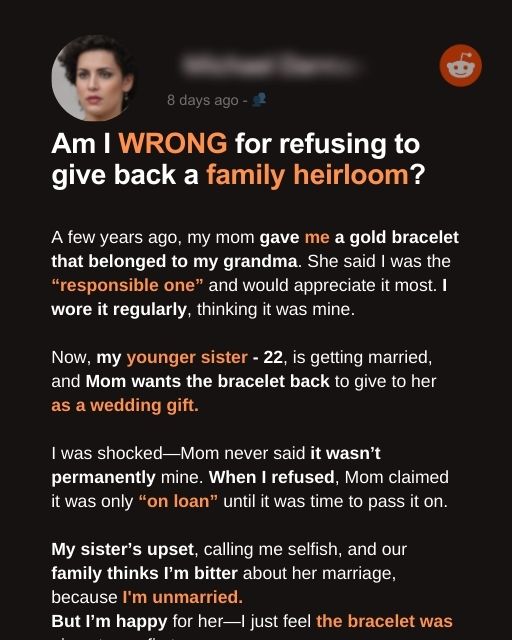A few years ago, my mom gave me a gold bracelet that belonged to my grandma. She said I was the “responsible one” and would appreciate it most. I wore it regularly, thinking it was mine.
Now, my younger sister – 22, is getting married, and Mom wants the bracelet back to give to her as a wedding gift.
I was shocked—Mom never said it wasn’t permanently mine. When I refused, Mom claimed it was only “on loan” until it was time to pass it on.
My sister’s upset, calling me selfish, and our family thinks I’m bitter about her marriage, because I’m unmarried. But I’m happy for her—I just feel the bracelet was given to me first.
I tried to explain my feelings to my mother, but she only sighed and said, “Sweetheart, I always meant for the bracelet to go to the first daughter who got married. It’s tradition.”
“Then why did you give it to me?” I asked. “You said it was mine. You never mentioned any conditions.”
She hesitated. “I thought you’d understand when the time came.”
That stung. Did she think I would just hand it over like a borrowed sweater? The bracelet had become part of my identity. I had worn it for years, through breakups, career struggles, and personal victories. It had been a reminder of my grandmother’s strength, and now they wanted to take it away?
My sister, Emma, called me the next day, her voice tight with frustration. “It’s not a big deal,” she said. “You don’t even have a husband. It makes sense for me to have it now.”
“Excuse me?” I snapped. “What does having a husband have to do with a bracelet?”
“It’s symbolic,” she argued. “Grandma wore it at her wedding. Mom wore it at hers. It’s supposed to be passed down to the next bride in the family.”
“Then why didn’t Mom keep it until your wedding day?” I countered. “She gave it to me. That means something.”
The argument spiraled, and by the end, Emma hung up on me. I sat staring at my phone, feeling equal parts angry and guilty.
The next few days were tense. Mom stopped bringing up the bracelet, but I could feel the unspoken pressure hanging over us. My dad, usually neutral in family conflicts, finally pulled me aside.
“You know, your grandma loved you both equally,” he said. “She would have wanted you to share, not fight over something material.”
“It’s not about the bracelet, Dad,” I murmured. “It’s about the principle. They think I should just give it up like it never mattered to me.”
He nodded slowly. “I get it. But maybe the real heirloom isn’t the bracelet. It’s the love you two should have as sisters. Think about what Grandma would say if she saw this fight.”
I did think about it. A lot. And finally, I made a decision.
On the morning of Emma’s wedding, I walked into her dressing room, holding the bracelet in my hands. She turned, startled, as I fastened it around her wrist.
“I still think it was unfair,” I said softly. “But I want you to have it today. As a gift, from me.”
Her eyes welled up. “You don’t have to do this.”
“I know,” I said. “But I also know that one day, I might get married, too. And when that happens, I hope you remember this moment.”
Emma pulled me into a hug, and for the first time in weeks, I felt a weight lift off my chest. Maybe the bracelet was meant to be passed down, but what truly mattered was the bond between us. And no family heirloom was more valuable than that.
Sometimes, letting go isn’t about losing—it’s about choosing what truly matters. Have you ever had to make a tough decision about a sentimental item? Share your thoughts in the comments, and don’t forget to like and share this story!




